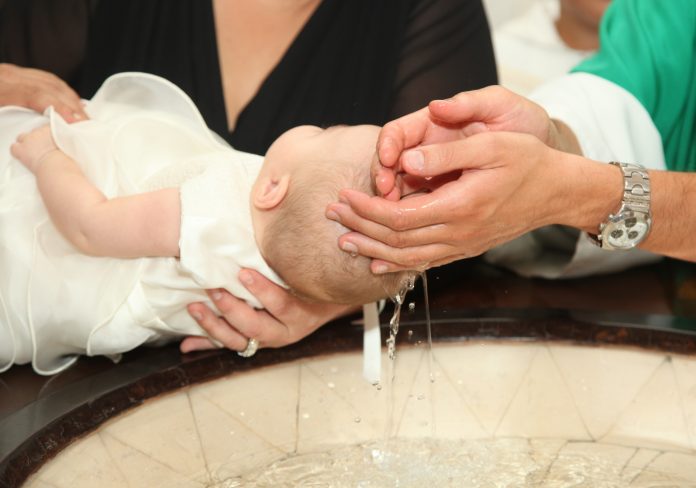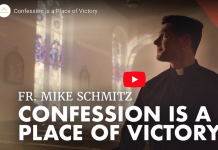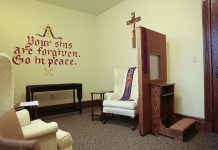
by Joe McHugh
Many generations of Catholics have thought that washing away Original Sin is the reason for Baptism. Indeed, the waters of Baptism do wash away Original Sin (and, in the case of adults, all personal sins). But the ritual barely mentions Original Sin; instead, it stresses our union with Christ throughout this life and eternity.
A Lifelong Journey
The blessing of baptismal water reminds us that we are created in God’s likeness. Then the blessing asks that those being baptized “may be cleansed from sin” and that they may “rise to a new birth of innocence by water and the Holy Spirit.”
The celebration of the Sacrament of Baptism is just one step—the first step and a very important step—in a lifelong journey of faith. God’s call and our response are celebrated in the ritual of Baptism that lasts only minutes but that pledges God’s continuing grace and seeks our lifelong response to his gift.
The Newness of Life
A candidate for Baptism in the early Church, usually an adult, would remove all clothing, a symbol of casting aside an old way of life by dying with Christ. Being plunged into the pool symbolized being buried with Christ; ascending from the pool and being given a new set of white clothes symbolized sharing in Christ’s Resurrection.
Today many churches have returned to this sort of architecture for their baptismal fonts. Whatever the shape of the font, the blessing prayer for the water reminds us of Paul’s understanding of Baptism: “May all who are buried with Christ in the death of baptism rise also with him to newness of life” (see Romans 6:4).
The Baptismal Water
We turn to the prayer for blessing of baptismal water to understand more of the rich theological meaning of the water. As the prayer says, God made water “a rich symbol of the grace” of the Sacrament. The prayer then spells out examples of this symbolism.
First, the prayer takes us back to creation (Genesis 1:1-2:4a): “At the very dawn of creation your Spirit breathed on the waters, making them the wellspring of all holiness.” You may not find the word “spirit” in your translation. But Genesis 1:1-2 reads: “In the beginning, when God created the heavens and the earth, the earth was a formless wasteland, and darkness covered the abyss, while a mighty wind swept over the waters.” To the ancient Hebrews, the “abyss” was the primordial oceans and the Hebrew word for “wind” also means “spirit.”
Next, the blessing prayer turns to the great flood recorded in Genesis 6-8. It may seem strange to think of the flood as a symbol for Baptism, but the prayer reminds us that the flood made “an end of sin,” and a “new beginning of goodness.” These are purposes of Baptism. Yes, Baptism removes Original Sin; Baptism also sets us on the path for a life of goodness.
At every Easter Vigil Mass, the most important reading from the Old Testament is Exodus 14:15-15:1. This is the story of how God frees the Israelites from slavery in Egypt. God tells Moses to hold out his staff over the waters of the sea. God parts the waters so that the Israelites can gain salvation from Egyptian oppression by marching through the sea on dry land. When Pharaoh’s troops try to follow, God sends the waters crashing back upon them. The blessing prayer draws a parallel between Israel’s being set free from slavery and God’s people being set free from sin.
The Source of New Life
Two final images appear in the blessing prayer. First, although he was sinless and did not need to have sins washed away, Jesus chose to be baptized by John in the Jordan River (Matthew 3:13-17; Mark 1:9-11; Luke 3:21-22). Jesus provides an example to us about living in the power of the Spirit.
The other image is found in John 19:31-34. The soldier’s lance thrust into the side of Jesus produces a flow of blood and water. The Church has long taken these elements as signs of the Eucharist and Baptism. Even as he hangs lifeless on the cross, Jesus provides the sources of new life for his people.
Baptism is not merely about washing away Original Sin. Baptism immerses us into the very history of salvation, into the marvelous plan of God for us. I would offer a final reflection on the dignity Baptism bestows by borrowing the words of the First Letter of Peter 2:9-10: “But you are ‘a chosen race, a royal priesthood, a holy nation, a people of his own, so that you may announce the praises’ of him who called you out of darkness into his wonderful light. Once you were ‘no people’ but now you are God’s people; you ‘had not received mercy’ but now you have received mercy.”
Joe McHugh holds a master’s degree in Christian education. He has written on the Scriptures for numerous periodicals over the past 25 years, and is the author of Getting to Know the Bible: An Introduction to Sacred Scripture for Catholics, a revision of a classic work by Fr. Melvin Farrell (ACTA, 2003).
Copyright 2010, Bayard, Inc. All rights reserved. This article is protected by United States copyright and other intellectual property laws and may not be reproduced, rewritten, distributed, redisseminated, transmitted, displayed, published or broadcast, directly or indirectly, in any medium without the prior written permission of Bayard, Inc.
This article was written by the Catechist Staff and appeared in Catechist magazine, December 2010.
Image Credit: Shutter Stock 359099084




